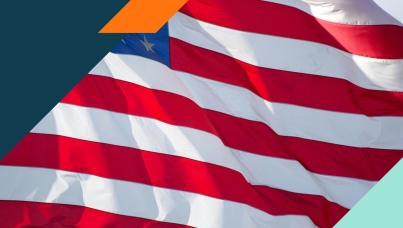Most Americans expect extreme weather events to become more frequent in the near future
Washington DC, July 7, 2025 – The latest USA Today/Ipsos poll, conducted between June 13-15, 2025, finds that 30% of Americans report personally experiencing an extreme weather event in the past month, down from 49% compared to a previous USA Today/Ipsos poll conducted July 21-23, 2023. However, a majority (58%) agree that extreme weather events will become more frequent in the near future.
The survey reveals a partisan gap on views of climate change. While 84% of Democrats agree that extreme weather events will increase in the near future, only 38% of Republicans feel the same. Democrats are also much more likely than Republicans to say that weather events like extreme heat, wildfires, and hurricanes have gotten more intense in the past decade.
Overall, more than half of respondents (56%) believe humans could slow climate change but lack the willpower to change their behavior. One in five (20%) feel it is already too late to stop climate change. Despite high concern about future impacts, only 17% think they will personally have difficulty remaining where they currently live due to climate change.
About the Study
This USA Today/Ipsos poll was conducted from June 13 through June 15, 2025, using the probability-based KnowledgePanel®. This poll is based on a nationally representative probability sample of 1,023 adults age 18 or older. The sample includes 281 Republicans, 307 Democrats, and 321 independents.
The survey was conducted using KnowledgePanel, the largest and most well-established online probability-based panel that is representative of the adult U.S. population. Our recruitment process employs a scientifically developed addressed-based sampling methodology using the latest Delivery Sequence File of the USPS – a database with full coverage of all delivery points in the U.S. Households invited to join the panel are randomly selected from all available households in the U.S. Persons in the sampled households are invited to join and participate in the panel. Those selected who do not already have internet access are provided a tablet and internet connection at no cost to the panel member. Those who join the panel and who are selected to participate in a survey are sent a unique password-protected log-in used to complete surveys online. As a result of our recruitment and sampling methodologies, samples from KnowledgePanel cover all households regardless of their phone or internet status and findings can be reported with a margin of sampling error and projected to the general population.
The data for the total sample were weighted to adjust for gender by age, race/ethnicity, education, Census region, metropolitan status, and household income. Party ID benchmarks are from the 2024 National Public Opinion Reference Survey (NPORS). The demographic benchmarks came from the 2024 March Supplement of the Current Population Survey (CPS).
- Gender (Male, Female) by Age (18–29, 30–44, 45-59 and 60+)
- Race/Hispanic Ethnicity (White Non-Hispanic, Black Non-Hispanic, Other, Non-Hispanic, Hispanic, 2+ Races, Non-Hispanic)
- Education (Less than High School, High School, Some College, Bachelor or higher)
- Census Region (Northeast, Midwest, South, West)
- Metropolitan status (Metro, non-Metro)
- Household Income (Under $25,000, $25,000-$49,999, $50,000-$74,999, $75,000-$99,999, $100,000-$149,999, $150,000+)
- Party ID (Republican, Leans Republican, Independent/Other, Democrat, Leans Democrat)
The margin of sampling error is plus or minus 3.2 percentage points at the 95% confidence level for results based on the entire sample of adults. The margin of sampling error takes into account the design effect, which was 1.11 For Republicans, the margin of sampling error is plus or minus 6.1 percentage points, and the design effect is 1.08. For Democrats, the margin of sampling error is plus or minus 5.9 percentage points, and the design effect is 1.10. For independents, the margin of sampling error is plus or minus 5.8 percentage points, and the design effect is 1.13.
The margin of sampling error is higher and varies for results based on sub-samples. In our reporting of the findings, percentage points are rounded off to the nearest whole number. As a result, percentages in a given table column may total slightly higher or lower than 100%. In questions that permit multiple responses, columns may total substantially more than 100%, depending on the number of different responses offered by each respondent.
Some data from the survey is trended against past national surveys conducted in July 2023, April 2023, April 2022, April 2021, April 2018, April 2017, August 2006, and August 2004. Data collected in July, 2023 April 2022, April 2021, April 2018, and April 2017 was collected via Ipsos’ non-probability online panel (iSay), while data from 2006 and prior was collected via telephone survey.
For more information on this news release, please contact:
Mallory Newall
Vice President, US
Public Affairs
+1 202 374-2613
[email protected]
About Ipsos
Ipsos is one of the largest market research and polling companies globally, operating in 90 markets and employing nearly 20,000 people.
Our passionately curious research professionals, analysts and scientists have built unique multi-specialist capabilities that provide true understanding and powerful insights into the actions, opinions and motivations of citizens, consumers, patients, customers or employees. Our 75 business solutions are based on primary data from our surveys, social media monitoring, and qualitative or observational techniques.
“Game Changers” – our tagline – summarizes our ambition to help our 5,000 clients navigate with confidence our rapidly changing world.
Founded in France in 1975, Ipsos has been listed on the Euronext Paris since July 1, 1999. The company is part of the SBF 120, Mid-60 indices, and is eligible for the Deferred Settlement Service (SRD).
ISIN code FR0000073298, Reuters ISOS.PA, Bloomberg IPS:FP
35 rue du Val de Marne
75 628 Paris, Cedex 13 France
Tel. +33 1 41 98 90 00



